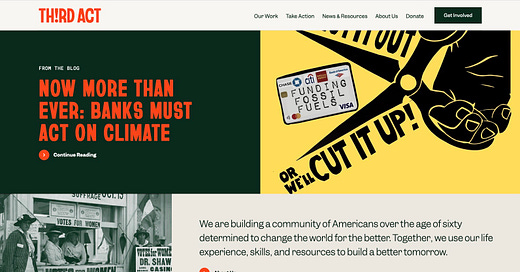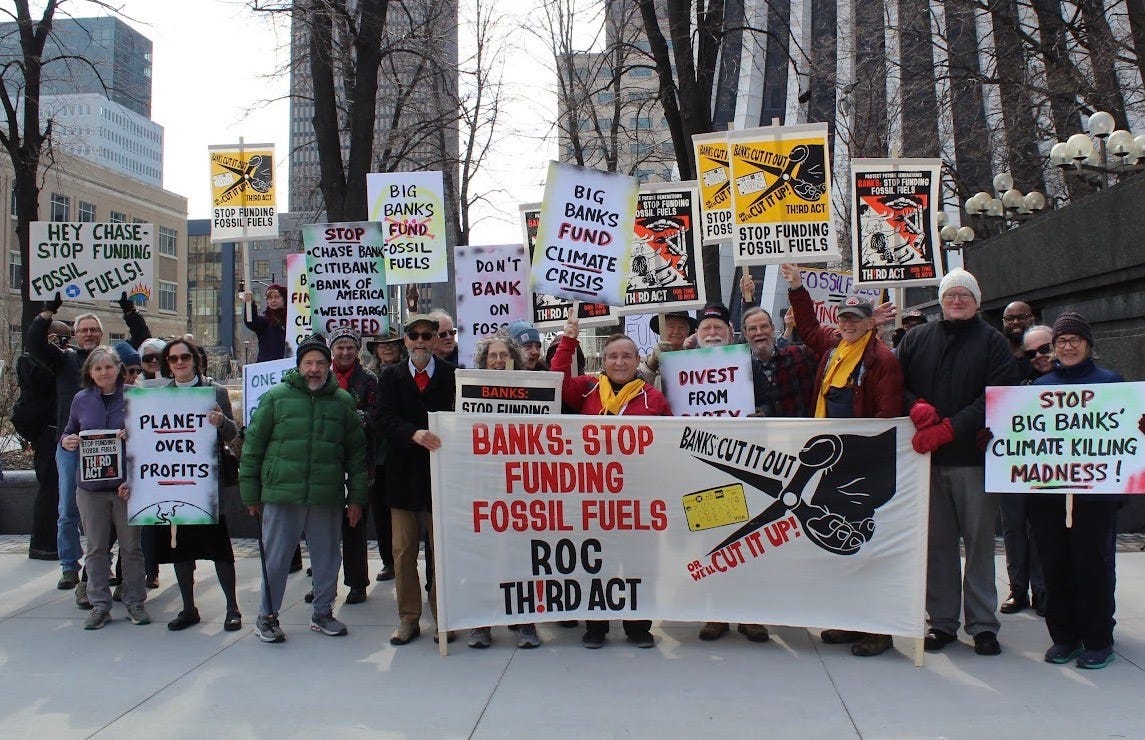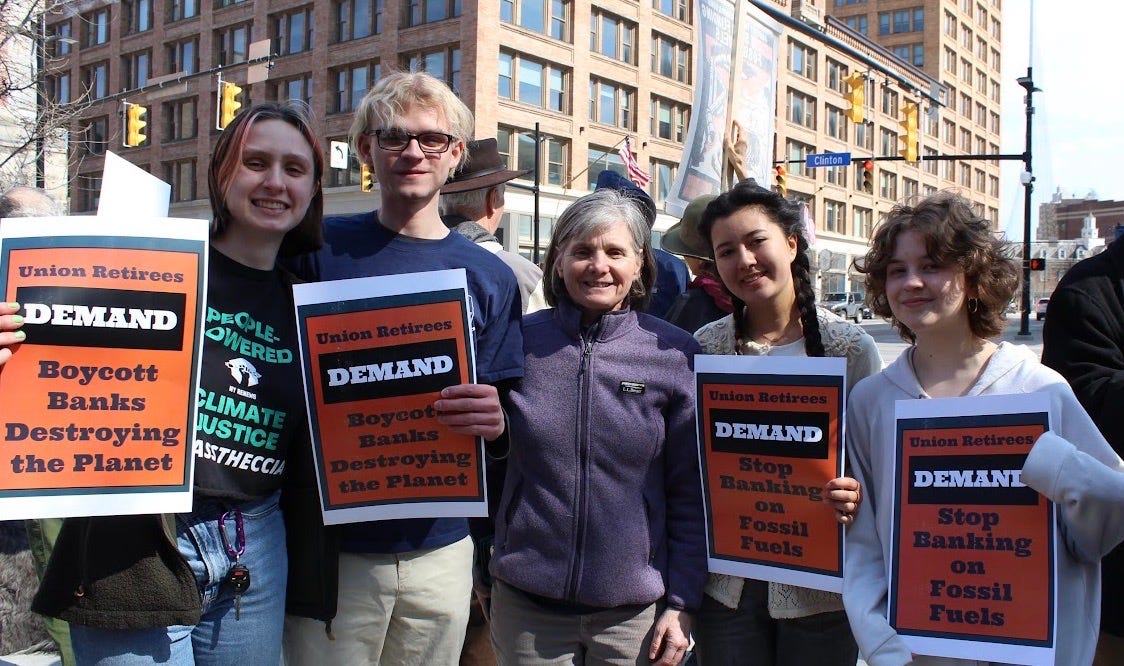Tuesday, March 21, I drove from Buffalo, NY to Rochester, NY, to join a protest, in the recently formed climate activist group ThirdAct.org. ThirdAct was started by long-time environmentalist, author, and professor, Bill McKibben, and is a powerful way for seniors to make a difference, a rocking chair rebellion, if you will. McKibben, who has been a force in the American environmental movement for decades, has written numerous books, and started the organization 350.org as well. 350 refers to the goal of reducing carbon in our atmosphere to a level that won’t endanger life on Earth, 350 parts per million (ppm).
Our Rochester protest group, photo courtesy of Bess Watts.
Currently, carbon stands at 420 ppm, and is climbing at a record rate. We are already experiencing devastating results, as witnessed by extreme drought, the melting of Arctic ice, increasingly destructive storms, and out of control wildfires. Before industrialization, carbon was just 280 ppm, providing the perfect conditions for life on Earth as we know it. #ClimateChange is an existential threat to our survival. It’s happening now. That is why I blog, and when I learned of the event, there was no question, I would attend.
McKibben traveled to Washington D.C. for the protest there, and more than 100 demonstrations were staged across the country, calling out Bank of America, Chase, J.P Morgan, and Wells Fargo as the largest financiers of big oil. ThirdAct calls on us who are older to consider where we keep our money.
The concept of ThirdAct is twofold. One, to support younger people who will suffer the worst consequences of climate change we seniors created, and two, to use our economic power as seniors, to kick the banks in the gut, their wallet, the only organ to which they respond. Many cut up their credit cards on Tuesday, and when the banks inevitably ignore us, we will close our accounts. With coordinated action, we can take billions of dollars away from the institutions that finance death. This will have a profound effect.
Young people have the awareness, passion, and energy we need, to gain control of this crisis, but they don’t have the wealth. Our wealth is a powerful tool. Although I personally, enjoy a good fight, you don’t have to attend a protest to have a profound impact.
Rochester is a small city, with a population of about 211,000 in the 2020 census, and an overall metropolitan area around one million. Much of the city’s success came from Eastman Kodak, and Xerox. The heart of the downtown where the rally was held was quite beautiful, with a mix of old and new architecture, and enough trees and to take the edge off the concrete (if not enough trees to actually cool the city). The Chase building is a soaring, sleek testament of modernity, and power, towering over three-story brick buildings of a bygone era, some of which stood empty and in disrepair, across the street. Walking from the parking garage to the event I immediately got a sense of what we see in most downtown and inner city America, the disparity of the haves and have-nots; the obviously indigent, making their “living” on the street, as compared to the “triumph” of American capitalism in that tower.
The protestors at the rally were what I expected, mostly older folk like myself, many ten or twenty years older, which I found inspiring. Here were seniors with a social conscience. The spirit of the 1960s could be seen in some gray ponytails. There were signs and banners of course, speeches, and some group encouraged chants. It was a good turnout, probably 60 or 70 people, more than what I expected from the online attendance list, a successful inaugural event. I noticed our spot on the block was to the side of Chase Tower, not in front, and I am guessing that’s what the organizers were able to get the city to agree to. I would have enjoyed obstructing the main entrance a bit.
There was no rock throwing, no spray-painting of slogans, no setting of fires. There were no police, apparently we didn’t look terribly dangerous. In some locations, protestors laid in the road to stop traffic. That didn’t happen in Rochester (I would have been down with that), but maybe that’s a tactic for later. Certainly, Chase bank ignored us, so we will likely need to go back. Some drivers honked their approval as they passed by.
There were four or five speakers including an environmental science professor from RIT, a union organizer, and most significantly for this article, a self-possessed young woman, Bridget Mousaw, who spoke. My daughter, just a couple of years older, came to my mind as I listened. People their age have few prospects for the future unless we get climate change under control. I can’t stop thinking about it. That’s why I write. That’s why I will lie in a road, if the occasion demands it.
Bridget’s speech was short, well-delivered, and to the point. I introduced myself, and she graciously agreed to share her words for this article, and an interview. I was, of course, thrilled, because I want to let younger people know I am in their corner. It’s their world now, we’ve left it in shitty condition, and we need to support them, or at the very least, get the hell out of the way.
Bridget Mousaw (left) and young friends. RIT Professor Susan Hughes-Smith (middle). Photo by Bess Watts.
Bridget is a high school senior. She doesn’t recall the moment she became aware of climate change exactly, but knows she was deeply impacted by her awareness around age 11 or 12. It distressed her to the point of constant worry. When I was 11 or 12, I was running through the woods, and skinning my knees from bicycle accidents. I wasn’t wondering if there would be a future for me. Kids of Bridget’s generation rightfully worry if they will be alive at 50. How childhood has changed.
I wanted a sense of what shaped her, outside that terrible fear she experienced. In spite of decades in age difference, I was confident we shared common ground, as evidenced by our solidarity at the rally.
Like myself, Bridget is an outdoors person. She loves to, hike, backpack, and run. Most of her outdoor time has been in the woodsy environments of New York State, Vermont, and New Hampshire. She has met Bill McKibben. We agreed, that much of the reason we are in such trouble is because of our disconnection to the natural world. So many never experience it, never leave their concrete environments. How can such people understand nature’s essentialness to our survival, let alone how a mountain top view, or a hushed forest can calm your soul?
We interviewed by phone as she walked, I could feel her energy, and enthusiasm. What I learned was inspiring. Bridget has channeled her fear into action. She is already deeply involved, at just eighteen, as the co-president of the Brighton High School Climate Club, and an officer in the Rochester Youth Climate Leaders. Her passion has already led to organizing, and meetings with state legislators, impressive. She is fighting for her life, and the lives of all her age.
From Bridget’s speech:
“Since climate activism has become an integral part of my life, and has given me so much confidence, I sometimes forget that the reason I started doing it in the first place was because I felt helpless and terrified. Just like many of my peers, I had acute climate anxiety as a child. This is fear that there will be nowhere for us to live our lives, build our dreams, and thrive in our communities. It also arises from the pressure often put on us (either directly or indirectly) by older generations. People often say they have hope that the rising generation will take action, but being the source of hope and action is a daunting responsibility, and in reality, it is one that we should share. Personally, though you may not guess it, I am someone who grew up with close family members who are climate deniers. I have had to live beside people that actively reject the existence of climate change, despite the effects we are seeing it have on the world. This has often made me feel as though I must be the one who takes on the work to try to heal the world. There is more being dumped on to my generation than ever before, and we are feeling the effects of it.”
Climate deniers are part of my life, too. How I understand her frustration and the injustice she feels.
“As I grew into a young adult, the fear I once felt morphed into something more like anger. Anger because I realized my generation was the dumping ground for decades of destruction. I was placed on this Earth where climate change was ignored for generations, where powerful corporations kept the public in the dark...where politicians make empty promises, mountains of money fund detrimental industries, and marginalized groups bear the brunt of it all.”
Bridget may be young, but she sees what so many choose to close their eyes to.
“...all of this, when put on paper, sounds absolutely awful, absolutely defeating, like something out of a dystopian novel. Yet we continue to fund it…”
This is where we older people can truly make a difference. Where we have our money counts. All we have to do to make an important difference is make some phone calls.
“Fossil fuels should be a dying industry, and it COULD be a dying industry...if we invested in alternate forms of energy and infrastructure. However, here we are in front of the fossil fuel industry’s number one funder who is funneling $382 billion into the industry annually. To these powerful corporations, the power is far more important than the well-being of humans...it is the game to maintain economic power. But this is NOT a game to me, or any of us living up here in the real world.”
Fossil fuels should have been on their way out on the way out after the Arab oil embargo in 1974, over thirty years before Bridget was born. Fossil fuels should have been on their way out again twenty years ago at “peak” oil, but then the filthy technology of shale extraction was invented, requiring billions of gallons of water even as rivers and lakes run dry. Our money is subsidizing this insanity. Bridget is correct, we should have been investing in clean forms of energy and infrastructure this entire time.
“Acting in the face of such a big and powerful company can be overwhelming and seem futile. And in reality, much of what we do as activists may go unnoticed by higher powers. But I assure you, as I have learned through many years of activism with amazing and inspiring young adults, each action strengthens the community. And the stronger the community, the closer we get to breaking the system. Those in power have no community, they simply fight for their own gain. Yet we fight for justice, hope, and love.”
Her words remind me of the undeniable wisdom of youth, so easily lost in compromise over the years. We need young people for many reasons, perhaps most to remind us of what’s true, and real. We owe them a future. It’s our moral duty.
As we spoke, an Amazon Prime truck pulled up in front of my neighbor’s house across the street. “That truck stops at that house three or four times a week,” I told her. “It makes me want to go over there and educate them.” Of course, I won’t, confrontation doesn’t work, we agreed. We need fast action, but we also need the patience to gently educate as we can. Many decent people are misinformed, under informed, or simply need encouragement, as the message we receive is that we have no power. This simply isn’t true. We have massive power. Banks and big oil have trillions of reasons to make you feel otherwise, our dollars, and they send their false messages every day.
ThirdAct.org is a giant opportunity to make a real difference. Many other opportunities can be found on their site as well. Bridget and I invite you to be part of this initiative. Be brave for Bridget. She is all of our children.






I don't think your job description included a hazmat suit and testing air, water, and soil samples, so give yourself a break. What's important is what we can do now, with our increased awareness and recognition of the trouble we're in. With political leadership so compromised by money, it comes down to us peasants to affect change. We should have been all along. Grassroots involvement, has largely been lost. Where we keep our money is, is a powerful tool. I believe in the potential power of ThirdAct.org, but we DO have to act collectively. My work is just a spit, but I sleep better doing what I can, with the idea of doing more as I evolve with this endeavor. I'll keep badgering, and thank you. BTW, senior is no insult!
Geoff: Thanks again for your insights. My family lived and worked in Rochester, NY twice via Xerox. At the time it was a progressive company focused on inclusion and innovation. After leaving Xerox, I found out the very Plant I had transferred to and worked at in Oakbrook, Ill is now a Superfund location. To my dismay I think about the employees that worked there for many years. I was transferred back to Rochester after a few years to a new job opportunity, but carry the burden of about of those dedicated employees, who committed many years and were exposed to hazardous waste. Please continue to bring collective awareness to us "seniors."